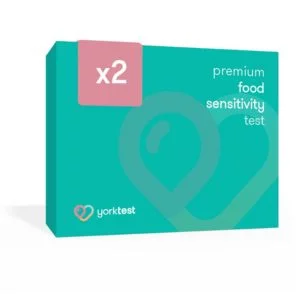- What Nutrition Challenges Do Seniors Face?
- Biological Changes
- Health Problems
- Special Nutrient Needs Of Seniors
- Common Late-Onset Food Allergies and Sensitivities
- Food Allergies
- Food Sensitivities
- Common Senior Dietary Restrictions
- Low-Carb or Diabetic Diet
- Pureed or Mechanical Soft Diet
- Clear Liquid Diet
- Thickened Liquids Diet
- Healthy Eating Tips for Seniors
- Getting Enough Liquids
- Avoiding Empty Calories
- Low-fat and Low-cholesterol Foods
- Nutrient-rich foods
- Additional Senior Nutrition Resources
According to the World Allergy Organization, a study showed that 24.8% of nursing home patients, with an average age of 77, had at least one food allergy.
This is a surprisingly high number, especially considering that seniors are actually at increased risk of developing allergies and sensitivities to foods that they have tolerated for years. This can be due to changes in the immune system that occur with age, as well as cell aging and decreased production of digestive enzymes.
Given these statistics, it is clear that food allergies are a serious concern for older adults. In this article, we will take a closer look at the different types of nutritional challenges for people over the age of 65, and explore some strategies for managing food allergies and sensitivities.
What Nutrition Challenges Do Seniors Face?
There are a number of factors that can make it difficult for seniors to get the nutrients they need from their food. These include:
Biological Changes
As people age, their bodies undergo a variety of changes that can affect their ability to digest food and absorb nutrients. For example, the digestive system becomes less efficient at breaking down food, and the gastrointestinal tract can become less acidic. This increases the risk for nutrient deficiencies and can make it difficult for seniors to get adequate calories from their food.
Here are a few other biological changes that can impact seniors’ nutrition:
- Loss of appetite: Appetite often decreases as people get older, which can lead to reduced intake of essential nutrients.
- Slower metabolism: The body’s metabolism slows down with age, which can lead to weight gain and difficulty losing weight.
- Loss of taste and smell: Seniors may lose their sense of taste and smell, making it difficult to enjoy food and identify nutritional deficiencies.
- Decreased sense of thirst: Older adults are less likely to feel thirsty, which can lead to dehydration and other health problems such as low blood pressure and kidney failure.
- Pain in the teeth and gums: Painful teeth and gums can make it difficult to chew food, and also reduce the number of nutrients that are absorbed from food.
Although these changes are natural, they can make it difficult for seniors to get the nutrition they need. It is important to be aware of these challenges and take steps to ensure that seniors are getting the nutrients they need.
Health Problems
Many seniors also suffer from health problems that can impact their nutritional status, which may lead to further complications such as malnutrition, weight loss, and dehydration.
Here are some common health problems that can affect seniors’ nutrition:
- Heart problems: Eating high-fat, high-sodium foods can worsen heart conditions and lead to weight gain.
- High blood pressure: Foods with a lot of salt can raise blood pressure and increase the risk for heart attack and stroke.
- Diabetes: Can involve damage to the pancreas , leading to a loss of insulin, which can create problems with nutrient absorption.
- Loss of bone density: A lack of calcium and vitamin D can lead to weak bones and an increased risk of fractures.
- Digestion issues: Seniors may experience problems such as GERD (gastroesophageal reflux disease), which can make it difficult to eat solid foods, and result in constipation and gut problems, which can lead to deficiencies in key nutrients.
- Weight gain: Many seniors tend to gain weight as they get older, which can lead to a host of health problems such as heart disease, diabetes, and arthritis.
- Medication side effects: Some medications such as laxatives can have side effects that reduce the number of nutrients that are absorbed from food.
- Mental health and loneliness: Social isolation and depression can lead to unhealthy eating habits and reduced intake of essential nutrients.
These are just a few of the many health problems that can impact seniors’ nutrition. It’s important to talk to your doctor about any health concerns you may have, as they can help you develop a plan to manage your specific condition.
Special Nutrient Needs Of Seniors
In addition to facing the challenges mentioned above, seniors also have special needs when it comes to nutrition. That is why having a good understanding of the essential nutrients for older adults is so important.
According to WebMD, these are some of the key nutrients that seniors require:
- Potassium: This mineral is important for maintaining blood pressure and preventing heart disease. Good sources of potassium include fruits, vegetables, and nuts.
- Vitamin B12: This vitamin is essential for energy production and healthy brain function. B12 can be found in meat, poultry, fish, and dairy products.
- Dietary fiber: Fiber is important for regular bowel movements and preventing constipation. Good sources of fiber include fruits, vegetables, and whole grains.
- Calcium and vitamin D: These nutrients are essential for people over the age of 65 in order to maintain strong bones. Calcium can be found in dairy products, leafy green vegetables, and calcium-fortified foods. Vitamin D can also be obtained from sunlight or supplements.
- Protein: Protein is essential for maintaining muscle mass and repairing tissues. Good sources of protein include meat, poultry, fish, eggs, legumes, and nuts.
- Iron: This mineral is important for energy production and preventing anemia. Good sources of iron include meat, poultry, fish, legumes, and leafy green vegetables.
- Magnesium: This mineral is important for nerve and muscle function. Good sources of magnesium include legumes, nuts, and whole grains.
- Omega-3 fatty acids: These fatty acids are important for maintaining heart health. Good sources of omega-3 fatty acids include fish, nuts, and seeds.
As you can see, there are many factors that can affect seniors’ nutrition. But by understanding the challenges they face and providing them with the right nutrients, you can help ensure they stay healthy and strong.
Common Late-Onset Food Allergies and Sensitivities
As people get older, they may develop new food intolerances such as allergies or sensitivities. However, food allergies are not the same as food sensitivities since they involve an immune response, while sensitivities do not.
While food allergies can occur at any age, they are more common in children than in adults. However, as we get older, our immune system may change and become more sensitive to certain foods.
Food sensitivities, on the other hand, are caused by different biological mechanisms than allergies. They can involve the immune system and are easily detected by measuring food-specific IgG levels. Lactose intolerance on the other hand is not caused by the immune system, but rather by the digestive system. The body may not produce enough of certain enzymes to break down certain foods, leading to symptoms such as bloating, and constipation.
Food Allergies
Food allergies can occur suddenly, even if you’ve never had an allergic reaction to a particular food before. Allergic reactions may range from mild (such as hives or itching) to severe (anaphylaxis).
That is why it is important to be aware of the common food allergens and to know what to do if you have an allergic reaction.
Here are some of the most common food allergens:
- Shellfish: Including shrimp, lobster, crab, and other seafood.
- Peanuts: A common food allergy for children, but adults can also be allergic to peanuts.
- Tree nuts: Including almonds, walnuts, cashews, and other nuts.
- Eggs: Including eggs, egg whites, and egg products.
- Milk: Including cow’s milk, goat’s milk, and sheep milk.
If you have a food allergy, it is important to read the labels on all of the foods you eat. Many foods, especially processed foods, contain hidden ingredients that may trigger an allergic reaction.
It is also important to be aware of the cross-contact that can occur when different foods are prepared in the same kitchen. For example, if you are allergic to peanuts, make sure to avoid foods that may have been prepared on the same surface as peanuts.
Food Sensitivities
There are many different foods that can cause sensitivities in seniors, but some of the most common ones include:
- Immune food sensitivity: This is the most common type of sensitivity to food proteins and involves the IgG antibody.
- Lactose intolerance: This is the inability to digest lactose, a sugar found in milk and dairy products. You may also have milk allergies or intolerance if you experience symptoms such as bloating, nausea, and diarrhea after eating dairy products.
- Gluten sensitivity: Gluten is a protein found in wheat, barley, and rye. People with gluten sensitivity may experience symptoms such as anxiety, abdominal pain, diarrhea, and fatigue.
- Sugar sensitivity: Sugar intolerance is a common problem that causes symptoms such as headaches, fatigue, and mood swings. It is usually caused by the overconsumption of sugar.
An accurate way to find out your food sensitivities is by taking a food sensitivity test which can detect IgG antibodies to different food antigens (proteins).
Once you know which foods you are intolerant or sensitive to, you can work on eliminating them from your diet or substituting them with other foods that will not cause you problems.
Finding out if you are allergic or intolerant to certain foods is important in order to maintain good health as you get older. With a little bit of planning, it is possible to eat a healthy, balanced diet that will meet your nutritional needs.
Common Senior Dietary Restrictions
While there are no specific dietary restrictions for seniors, there are some foods that may be harder to digest as we get older.
Some common dietary restrictions for seniors include:
Low-Carb or Diabetic Diet
A low-carb or diabetic diet is a diet lower in carbohydrates and higher in protein and healthy fats. It can be a good diet for seniors who are struggling to lose weight or control their blood sugar.
Pureed or Mechanical Soft Diet
A pureed or mechanical soft diet is a diet that consists of foods that have been ground up or mashed into a smooth texture. This type of diet is often recommended for seniors who have trouble chewing or swallowing.
Clear Liquid Diet
A clear liquid diet is a diet that consists of foods that are low in fiber and nutrients. There are many different versions of this diet, but all of them involve eating foods that are easy to digest and do not contain any solid pieces.
Thickened Liquids Diet
A thickened liquids diet is a diet that consists of foods that have been thickened with a substance such as cornstarch. This type of diet is often recommended for seniors who have trouble swallowing, in order to help them avoid choking.
Healthy Eating Tips for Seniors
There are a few simple things that you can do to make sure that seniors are getting the nutrients they need from their food.
Below are some healthy eating tips for seniors:
Getting Enough Liquids
It is important for seniors to drink plenty of fluids, especially water. Liquids help to hydrate the body and keep you feeling energized.
Avoiding Empty Calories
Empty calories are foods that provide little nutritional value and are high in sugar, salt, or unhealthy fats such as saturated and trans fats. These foods can contribute to weight gain and other health problems.
Low-fat and Low-cholesterol Foods
There are many health benefits to eating a diet that is low in fat and cholesterol, such as reducing your risk of heart disease and stroke. A few examples of low-fat, cholesterol-free foods include fruits, vegetables, lean protein, and whole grains.
Nutrient-rich foods
Nutrient-rich foods are foods that are high in vitamins, minerals, and other nutrients. These foods can help to boost your immune system and keep you healthy. Some good examples of nutrient-rich foods include dairy, fish, and legumes.
Eating a balanced diet is important for everyone, but it is especially important for seniors who are at risk of nutrient deficiencies. By following the tips above, you can make sure they are getting the nutrients they need from their food.
Additional Senior Nutrition Resources
Here are some additional resources that can help you learn more about senior nutrition:
- Nutrition Guidelines for Older Adults – WebMD: Includes a variety of information on senior nutrition, such as the importance of eating a balanced diet, and how to make healthy food choices.
- Older Individuals – Nutrition.gov: You will find comprehensive resources that include information on eating for a healthy older age, reducing disease risk, and meeting nutrient needs.
- Healthy Eating Tips for Seniors – National Council On Aging: Provides helpful advice on how to make the most of your food choices, including ways to increase your intake of important nutrients.
- Healthy Eating for Older Adults – Academy of Nutrition and Dietetics: This website provides an overview of the importance of good nutrition for seniors, as well as tips for how to make healthy eating easier.
- Food Allergies in the Elderly – Annals of Allergy, Asthma & Immunology: Provides information on the prevalence of food allergies in people over the age of 65.
- Food Allergies and Ageing – National Library of Medicine: This article provides detailed information on food allergies and how they can impact seniors.










